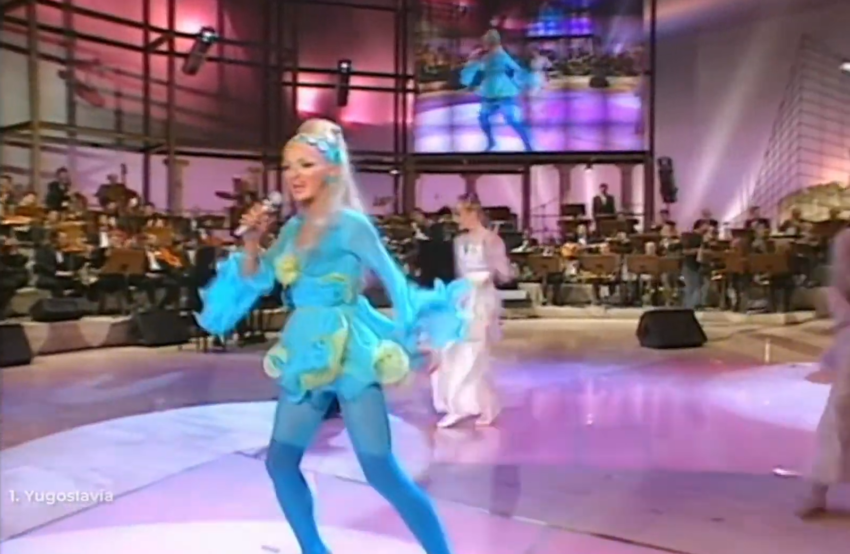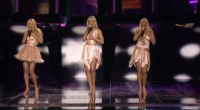
Tension was a high in Yugoslavia in spring 1991. The country was collapsing. A dodgy voting at the national final and a poor Eurovision was the last nail in the coffin. 30 years later, Eurovision fans react to what became the last ever Yugoslavian entry.
Jugovizija 1991 was held on the 9th of March 1991 with 16 songs in total taking part. Eight regional juries consisting of three people each decided the outcome. Tensions in the area in 1991 was quite high, and the national final voting showed clearly that the juries from the Serbian controlled areas like Montenegro, Kosovo and Vojvodina all voted for Bebi Dol, and gave none or very few points to songs from the other areas. Her song Brazil only received points from Serbia, Montenegro, Vojvodina and Kosovo.
In the 1980s, only one Serbian entry represented Yugoslavia (in 1982). One was Bosnian, two Montenegrin and the rest Croatian, including their 1989 winner Rock Me and 1990s Tajči and her much loved Yugoslavian classic Hajde Da Ludujemo. In 1991, Serbia was, after nine years, again represented by one of ‘their own’.
Among the other participants in the national final, we find 1983 Eurovision representative Daniel. Going into Jugovizija 1991, he was the top favourite. Another name in this 1991 national selection that might ring a bell with Eurovision followers is Tony Cetinski. He would later represent Croatia at the 1994 Eurovision Song Contest.
Whether it was the unfortunate draw of starting first, or if Bebi Dol’s Brazil simply wasn’t good enough, we’ll let you decide yourself, but fact is that it received only 1 point (from Malta) and finished second to last.
(We’re calling it the last ever Yugoslavian entry as though Yugoslavia did take part in 1992, it only consisted of Serbia and Montenegro. Slovenia, Bosnia, Croatia and Macedonia had left, and Yugoslavia didn’t exist in May 1992.)
Brazil – opinions from fans
In order to find out what Eurovision fans today think of this Yugoslavian entry from 1991, we asked our Eurovision Fan Panel. It includes team members as well as fans from all over the world.
🇦🇺 Michael R. – Yugoslavia’s final Eurovision entry as a union state has always been a guilty pleasure of mine. It’s camp and trashy as hell, but it is also a feel good track. Sadly the live performance was not the best and if the Barbara Dex award had existed in 1991, this would’ve won it (not easy in a style challenged year like 1991) but it remains an iconic performance in my eyes.
🇧🇦 🇩🇰 Elvir P. – Brazil is in my opinion one of the worst Yugoslav entries in history of Eurovision Song Contest. Yes, the song may come through as funny and crazy, but musically it is one huge car crash. Bebi Doll’s vocal was awful and the orchestration of the song didn’t help at all. The Yugoslav national selection back in 1991 was strong, and it is such a shame that one of the weakest songs won mainly due to the political situation in Yugoslavia back then.
🇭🇺 Vangelis M. – Yugoslavia’s entry in 1991 is really funny. I did not like anything at all but I laughed. To me the singer seems like a mother who is made by the father to celebrate the carnival for the young child they have, but she does not want to do it. Also, the singer has not huge singing abilities.
🇩🇰 Charlotte J. – No, no and no. This is not a song that works for me. In fact, it’s quite annoying. I like that the staging fits the song, but I can’t get myself engaged in Brazil. Sorry.
🇳🇴 Stine F. – This song would be perfect as entertainment on a cruise. I find it energetic, and it has a happy, positive vibe, but it gets too repetitive. It definitely lacks a bridge or something to mix it up. Not a favourite of mine, but at least it makes me dream about times when we will be able to travel again.
🇨🇿 Josef S. – We sometimes have the chance to get some exotic and unexpected things at Eurovision and a song called Brazil by a Yugoslavian singer in 1991 is really a big surprise. But a pleasant change from all the European ballads and usual songs, so sometimes this risk may pay out. In my eyes it worked for Yugoslavia. The performance and Baby Doll’s turquoise dress are just unforgettable.
🇩🇰 Liza P. – I’m trying to decide if Baby Doll is a joke or just a bad act. Either way I think that this is a terrible start of a otherwise musically strong year. The aquamarine colour hell takes the attention away from the weak vocal. And sometimes I get distracted by the overeager dancers, whose costumes I still can’t understand. Without the image, I actually think the song is fine, but this eye assault is generally annoying. At least she didn’t choose a pink suit. I would say it’s well deserved, that she finished 21st.
🇬🇧 Michael O. – At the time I really liked this entry and thought it was a great fun opener to the contest. Now I see it’s a little tacky, but it deserved more than just one point.
🇨🇴 🇫🇮 Alvaro S. – I wonder what the Brazilian audience thinks about this unrequested inspiration the former Yugoslavia country take from them. In my case, I can say that the song made me smile about the dance that is a little bit silly, but so full of joy and colour!
🇪🇸 Quique B. – Brazil is a strange song that talks about this country and others of America but sounds a bit like Spanish flamenco. It’s not the kind of Eurovision entry I like and neither that nor Baby Doll catches my interest.
I can’t say much more about this song, it’s a pity. Yugoslavia had better entries in their Eurovision history.
🇷🇸 Miljan T. – I remember LOVING Brazil as a kid and falling asleep just after it was performed at Eurovision. The song is still popular today and my boyfriend and I even listen to it these days – changing between the original version from Yugovizija and the Eurovision version. Aside from it being second to last at Eurovision, this song and the way it was chosen were one of the last nails in the coffin of Yugoslavia. The campiness of it was clearly way ahead of its time, and I firmly believe that with televoting and in today’s climate it would’ve placed much better.
Enjoy Baby Doll’s performance from the 1991 Eurovision Song Contest in the embedded video. Below the video, you can read more about her:
Bebi Dol – a mini biography
Bebi Dol (She called herself Baby Doll at Eurovision), whose real name is Dragana Šarić, was born in 1964 in Belgrade. Šarić started her professional career as a member of the less-known band Trakus in the late seventies. In 1981, Šarić formed short-lived band Annoda Rouge and released her debut solo single Mustafa. In 1983, Šarić released her first solo album Ruže I Krv.
In 1991, after several previous attempts, Šarić was finally chosen as the Yugoslavian entry for the Eurovision Song Contest in Rome with the song Brazil. Unfortunately scoring only one single point and finishing second to last.
She released her second album Ritam Srca in 1995. In 2009, Šarić appeared in the reality television show “Farma” and returned for its 2013 and 2015 seasons. In 2017, Bebi Dol was a contestant in the fourth Serbian season of Your Face Sounds Familiar, winning the first episode as Emeli Sandé. In 2015, she married American-born Serbian professor of philology and Russian language Aleks Todorović and has allegedly changed her name to Danica Todorović.




















